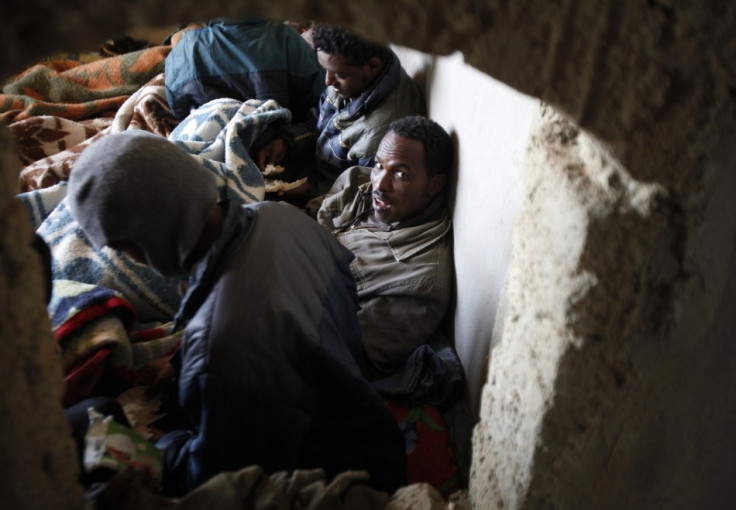Eritrean Officials 'Plotting with Gangs to Kidnap Thousands'
Human trafficking in Sinai caused by Eritrean and Sudanese officers who collude with Bedouin gangs

Tens of thousands of Eritreans have been kidnapped by the country's senior military officers and taken to Egypt's Sinai where they suffer torture and ransom demands, according to a report by human rights activists.
Between 2007 and 2012, some 25,000 to 30,000 migrants were trafficked by Eritrean and Sudanese security officers, who collude with Bedouin gangs, stated the report by Meron Estefanos, a Swedish human rights activist. Professor Mirjam van Reisen and Dr Conny Rijken of Tilburg University in the Netherlands also helped author the report.
The study, entitled The Human Trafficking Cycle: Sinai and Beyond, was presented before the European Commission and estimates that at least $600m (£366m) has been extorted from families in ransom payments.
Those targeted areEritreans fleeing the country. It was estimated that 3,000 Eritreans flee their impoverished and repressive homeland every month.
Some 230 Eritrean victims of trafficking were interviewed in the study. The finger of blame is pointed at Eritrea's Border Surveillance Unit, led by General Teklai Kifle (alias Manjus). Eritrean and Sudanese security officers collude with Bedouin groups that hold people hostage in the Sinai.
Burned, Beaten, Electrocuted and Raped
Eritreans are abducted by senior military officers and smuggled into Sudan. There, they phone the victims' families and threaten to sell the hostages to Bedouin traffickers in Sinai, if relatives do not raise tens of thousands of dollars.
Given the "restrictions on movement within the country, the requirement of exit visas at the border and the shoot-to-kill policy for illegal border crossings", the trafficking would have been unmanageable without the help of local Eritrean security officials.
"[The hostages] are chained together without toilets or washing facilities and dehydrated, starved and deprived of sleep," the report said.
Torture methods include burning, beating, and electrocuting. Some hostages are slashed with knives, or have bottles melted on their skin. Some are repeated raped; some have been hung.
"Torture is no longer just functional it is sadistic. Traffickers have become increasingly creative with their torture methods."
"They are subject to threats of death and organ harvesting [...] Those who attempt to escape are severely tortured," it said.
Dawit's sister
Some of those who are abducted had no intention of leaving Eritrea.
Dawit, an Eritrean living in UK's Birmingham since 2005, recounted how his sister - a single-mother with two kids and her own business - suddenly disappeared.
"She had a good job and was not thinking of leaving the country," he told IBTimes UK. After two days Dawit received a call from his mother telling him that his sister had been kidnapped.
"It was 12 July 2013 and the kidnappers asked for $10,000 to be paid on the same day, otherwise my sister would have been sent to Sinai."
"My family is of poor bearings and we could not afford to pay. But if she was going to Sinai the ransom would have been much worse," he said.
After seven days, Dawit's mother received another call from the kidnap gangs saying that the woman was in Sinai.
"My mother and auntie didn't want me to contact directly the gang because if they knew my sister had a rich brother in the west, they would have asked for more," Dawit said.
"I don't know where she is now."
This time the Bedouin group asked for $35,000 within three days. The woman was beaten, electrocuted and raped on her first day. "Once she called my family screaming 'I'm dying'," Dawit said.
Dawit was left with no other solution but to borrow money from friends, leaving him bankrupt and with a huge debts. He finally paid the ransom in two instalments.
Then, Sheikh Mohammed al-Maniri, a young Bedouin leader who assists in the rescue of Eritrean victims of people trafficking, phoned him saying his sister was given to Egyptian authorities.
However, the nightmare is not over yet. "I don't know where she is now," said Dawit.
Refugees who escape trafficking are often detained by Egyptian or Israeli authorities, imprisoned then forced to pay their own deportation fees.
Many Eritreans do not survive the gauntlet of trafficking and torture. It has been estimated that between 5,000 and 10,000 of the hostages died in captivity.
© Copyright IBTimes 2025. All rights reserved.






















